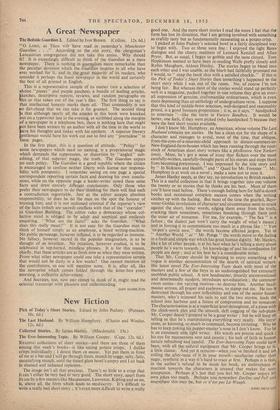A Great Newspaper
The Bedside Guardian 2. Edited by Ivor Brown. (Collins. 12s. 6d.)
"O LORD, as Thou wilt have read in yesterday's Manchester Guardian . . ." According to the old story, the clergyman's Lancastrian congregation did not take this amiss. Why should it? It is exceedingly difficult to think of the Guardian as a mere newspaper. There is nothing in journalism more remarkable than the peculiar devotion which the Guardian inspires in all who have ever worked for it, and in the great majority of its readers, who consider it perhaps the finest newspaper in the world and certainly the best of all printed in English. .
This is a representative sample of its matter (not a selection of choice "pieces" and purple patches), a bundle of leading articles,
tketches, descriptive reports, reviews, and random paragraphs on his or that taken out of the year's files. The first thing to say is that intellectual honesty marks them all. That commodity is not to dirt-cheap that we can take it for granted. The second thing s that although nearly all the articles in this book were knocked
■ ut on a typewriter late in the evening, or scribbled along the margins tof a newspaper in a telephone box, there is nothing here that might
Iof have been written by an author with all the time in the world to ieve his thoughts and tinker with his epithets. A superior literary entleman would have his work cut out to find any "journalese" in these pages. In the first place, this is a question of attitude. "Policy" for some newspapers which need no naming, is a proprietorial magic which demands the suppression, or distortion by "angled" sub- editing, of that superior magic, the truth. The Guardian enjoys no such policy. The Guardian is a good republic where the citizen is encouraged to confuse neither liberty with license nor responsi- bility with pomposity. I remember seeing on one page a special correspondent reporting certain facts and drawing his own conclu- sions, while on the opposite page a leader-writer noted these satne facts and drew entirely different conclusions. Only those who prefer their newspapers to do their thinking for them will find such a contradiction regrettable. Just as the editor accepts absolute responsibility, so does he do the man on the spot the honour of trusting him; and it is not reckoned criminal if the reporter's view of the facts (which are sacred) conflicts with that of the "corridor" in Guardian Building. The editor rules a democracy whose col- lective mind is obliged to be adult and sceptical and endlessly enquiring. "What are the facts?" asks the Guardian. "What does this really mean?" It is not easy for the Guardian man to think of himself simply as an employee, a hired writing-machine. No public personage, however inflated, is to be regarded as immune. No fallacy, however sacred in the popular imagination, is to be thought of as inviolate. No occasion, however exalted, is to be celebrated in top-hatted, mindless phrases. It is for this reason, chiefly, that these articles are as fresh now as when they were written. From what other newspaper could one take a representative sample that would not be dusty in a few weeks? One cannot mention all the contributors, so one will mention none. It is, after all, like the newsprint which comes folded through the letter-box every morning, a collective achievement.
And Socrates, too, now one comes to think of it, might read the celestial transcript with pleasure and understanding.
LAIN HAMILTON










































 Previous page
Previous page